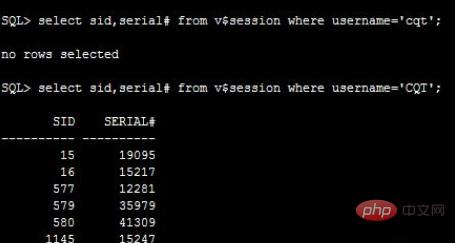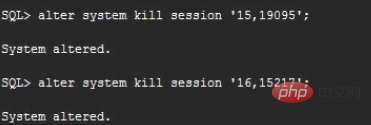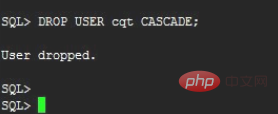What should I do if Oracle cannot delete a user?
Method: 1. Use the "select sid,serial# from v$session where username=''" statement to query session information; 2. Use the "alter system kill session ''" statement to kill the session; 3. Restart delete users.

The operating environment of this tutorial: Windows 10 system, Oracle 11g version, Dell G3 computer.
What should I do if oracle cannot delete the user?
The Oracle database in the test environment needs to be refreshed as the software development version is upgraded, because after the test environment is used for a period of time, the data in it There will be more and more. Sometimes for the convenience of functional testing, the data in the database in the test environment will be inconsistent, which will have a certain impact and interference on the testing of subsequent versions. In order to avoid the above situation, generally all objects under the current database user will be cleared first and then re-created. But to delete all the objects and data under a user, you need to first find out what objects are under the current user, and then delete them. Using the cascade deletion method of deleting users is very simple and convenient, but if the user currently to be deleted is connected, then It cannot be deleted. You need to kill the session first and then delete it.
First you need to use the xshell tool to connect to the oracle database server (the introduction here is in the linux environment, the windows environment is simpler). If the current linux user is not an oracle user, you need to switch to the oracle user. Enter the command, su - oracle to switch

Execute under the oracle user, sqlplus / as sysdba, that is, log in to the database as the administrator sys. Deleting users generally only has the administrator account If you only need to query database tables and data, you only need to log in with a normal account. After connecting, you will be prompted with Connected to: oracle databases and other prompts, and the input prompt that appears becomes SQL>

Then enter the statement to delete the user, DROP USER cqt CASCADE; CASCADE means cascading deletion of all object information under the user. As shown in the figure, ORA-01940 error, the currently connected user cannot be deleted

If you want to continue deleting, you need to first query the user who is currently connected. Session information, then kill it, and then perform the delete operation. The query statement is: select sid,serial# from v$session where username='CQT'; note the difference in case. As shown in the figure, multiple session information connected to the user is queried. It is necessary to kill all the user sessions queried above.

The statement to kill the session is: alter system kill session '15,19095'; For multiple sessions, you can kill them multiple times.

After the above sessions are cleared, execute the command to delete the user again. As shown in the picture, it can be deleted successfully this time. Because this statement adds the cascade delete keyword, all objects and data under this user will be deleted.

The above completes the deletion of users and objects. If it is a database brush operation, you can start to re-create the user and then assign permissions and execute the database script. A new round of version testing is underway.
Notes
Be careful when deleting user objects in cascade to avoid deleting the wrong user or information. You can back up the data before operating.
Recommended tutorial: "Oracle Video Tutorial"
The above is the detailed content of What should I do if Oracle cannot delete a user?. For more information, please follow other related articles on the PHP Chinese website!

Hot AI Tools

Undresser.AI Undress
AI-powered app for creating realistic nude photos

AI Clothes Remover
Online AI tool for removing clothes from photos.

Undress AI Tool
Undress images for free

Clothoff.io
AI clothes remover

Video Face Swap
Swap faces in any video effortlessly with our completely free AI face swap tool!

Hot Article

Hot Tools

Notepad++7.3.1
Easy-to-use and free code editor

SublimeText3 Chinese version
Chinese version, very easy to use

Zend Studio 13.0.1
Powerful PHP integrated development environment

Dreamweaver CS6
Visual web development tools

SublimeText3 Mac version
God-level code editing software (SublimeText3)

Hot Topics
 What to do if the oracle can't be opened
Apr 11, 2025 pm 10:06 PM
What to do if the oracle can't be opened
Apr 11, 2025 pm 10:06 PM
Solutions to Oracle cannot be opened include: 1. Start the database service; 2. Start the listener; 3. Check port conflicts; 4. Set environment variables correctly; 5. Make sure the firewall or antivirus software does not block the connection; 6. Check whether the server is closed; 7. Use RMAN to recover corrupt files; 8. Check whether the TNS service name is correct; 9. Check network connection; 10. Reinstall Oracle software.
 How to solve the problem of closing oracle cursor
Apr 11, 2025 pm 10:18 PM
How to solve the problem of closing oracle cursor
Apr 11, 2025 pm 10:18 PM
The method to solve the Oracle cursor closure problem includes: explicitly closing the cursor using the CLOSE statement. Declare the cursor in the FOR UPDATE clause so that it automatically closes after the scope is ended. Declare the cursor in the USING clause so that it automatically closes when the associated PL/SQL variable is closed. Use exception handling to ensure that the cursor is closed in any exception situation. Use the connection pool to automatically close the cursor. Disable automatic submission and delay cursor closing.
 How to create cursors in oracle loop
Apr 12, 2025 am 06:18 AM
How to create cursors in oracle loop
Apr 12, 2025 am 06:18 AM
In Oracle, the FOR LOOP loop can create cursors dynamically. The steps are: 1. Define the cursor type; 2. Create the loop; 3. Create the cursor dynamically; 4. Execute the cursor; 5. Close the cursor. Example: A cursor can be created cycle-by-circuit to display the names and salaries of the top 10 employees.
 How to stop oracle database
Apr 12, 2025 am 06:12 AM
How to stop oracle database
Apr 12, 2025 am 06:12 AM
To stop an Oracle database, perform the following steps: 1. Connect to the database; 2. Shutdown immediately; 3. Shutdown abort completely.
 How to paginate oracle database
Apr 11, 2025 pm 08:42 PM
How to paginate oracle database
Apr 11, 2025 pm 08:42 PM
Oracle database paging uses ROWNUM pseudo-columns or FETCH statements to implement: ROWNUM pseudo-columns are used to filter results by row numbers and are suitable for complex queries. The FETCH statement is used to get the specified number of first rows and is suitable for simple queries.
 What steps are required to configure CentOS in HDFS
Apr 14, 2025 pm 06:42 PM
What steps are required to configure CentOS in HDFS
Apr 14, 2025 pm 06:42 PM
Building a Hadoop Distributed File System (HDFS) on a CentOS system requires multiple steps. This article provides a brief configuration guide. 1. Prepare to install JDK in the early stage: Install JavaDevelopmentKit (JDK) on all nodes, and the version must be compatible with Hadoop. The installation package can be downloaded from the Oracle official website. Environment variable configuration: Edit /etc/profile file, set Java and Hadoop environment variables, so that the system can find the installation path of JDK and Hadoop. 2. Security configuration: SSH password-free login to generate SSH key: Use the ssh-keygen command on each node
 How to create oracle dynamic sql
Apr 12, 2025 am 06:06 AM
How to create oracle dynamic sql
Apr 12, 2025 am 06:06 AM
SQL statements can be created and executed based on runtime input by using Oracle's dynamic SQL. The steps include: preparing an empty string variable to store dynamically generated SQL statements. Use the EXECUTE IMMEDIATE or PREPARE statement to compile and execute dynamic SQL statements. Use bind variable to pass user input or other dynamic values to dynamic SQL. Use EXECUTE IMMEDIATE or EXECUTE to execute dynamic SQL statements.
 What to do if the oracle log is full
Apr 12, 2025 am 06:09 AM
What to do if the oracle log is full
Apr 12, 2025 am 06:09 AM
When Oracle log files are full, the following solutions can be adopted: 1) Clean old log files; 2) Increase the log file size; 3) Increase the log file group; 4) Set up automatic log management; 5) Reinitialize the database. Before implementing any solution, it is recommended to back up the database to prevent data loss.






